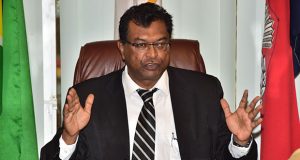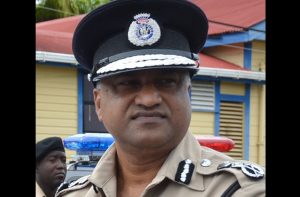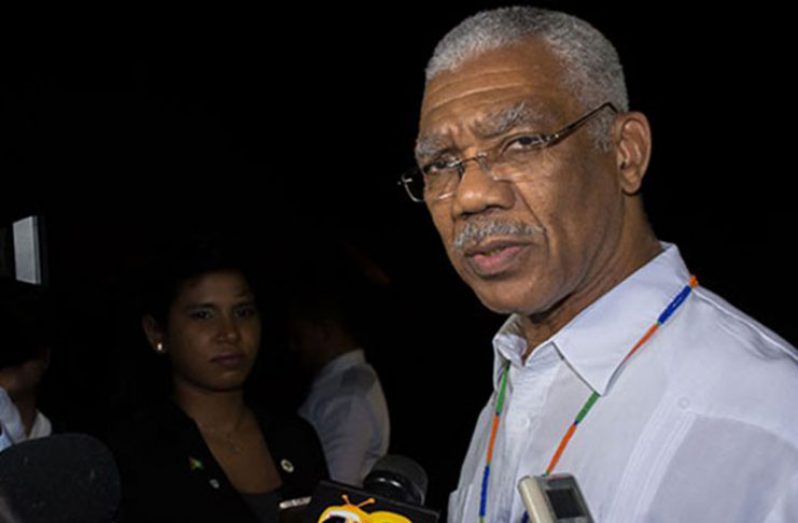PRESIDENT David Granger is of the view that a campaign is afoot to embarrass his Government and the Guyana Police Force; because hardly a day passes without a robbery or crime of some sort being committed.Commenting on his weekly television programme, ‘The Public Interest’, on Thursday — one day after the home of People’s Progressive Party/Civic (PPP) General Secretary Clement Rohee was robbed — the President said: “I am suspicious…that there are some persons who are committing crimes to show that the Police Force and Government are weak. We don’t know for sure what is taking place, but many of these crimes have their origin in the weakening of the Police Force in the early days, and so we have a very serious problem on our hands.”
He pointed out that the GPF is not devoid of rogue elements, although he is satisfied that the Force has made some headway in regard to solving many high-profile and violent crimes.
“We reckon that the decision that we took to bring the British Security Sector Reform Programme here is the right one, because we cannot proceed in this country with an unreformed Guyana Police Force; and some of the actions which are taking place convince me that reform has to take place, and we are going to do that,” he promised.

Noting that his Administration remains committed to doing everything possible to ensure citizens’ safety, the President pointed out that reducing the high incidence of violent crime continues to be a priority.
MEASURES
Among the changes to be instituted are the tightening of border security and control, to prevent the transport of illegal guns and narcotics; more street patrols; the presence of mounted police in the hinterland and riverine areas of the country; collaboration between the Guyana Police Force (GPF) and community policing groups (CPGs); provision of assets such as drones for border monitoring and aerial surveillance; reduction of cash transactions; implementation of a ‘Smart City’ programme which would see cameras being installed along strategic points across the country; the yearly review of gun licences; and security sector reform.
The President said his focus is on comprehensive crime-fighting strategies that address the root causes of crime, to ensure long-term results.
“When you hear about gun crimes, Guyana doesn’t manufacture guns. When you hear about narcotics’ trafficking, Guyana doesn’t manufacture cocaine; but these are crimes which have a very serious impact, so we have to deal with other countries in the international community and in the Caribbean Basin. We have to deal with the interpersonal violence, street crimes; and these crimes are sometimes fuelled by the same narcotics or guns which are imported from outside,” he said, speaking specifically of cross-border crime.
Crime, the President said, is a complex matter, and his Administration has a complex strategy to deal with it. “There are a lot of youngsters who grew up through the ‘troubles’ and still believe that the solution to their problems or whatever they want to achieve in their life is through the barrel of a gun… We have a strategy, and part of that strategy is to limit the inflow and impact of transnational crimes by securing our borders and by working with communities.”
A PRIORITY
With the Government working to ensure that all aspects of crime are reduced in the first instance, one of its priorities is limiting the access to illegal firearms and managing the issuance of gun licences. Government would therefore embark on a review of the issuance of gun licences to private citizens, especially now that information has surfaced that legal guns are also involved in gun-related crimes, President Granger had said.
Public Security Minister Khemraj Ramjattan has said the system for the issuance of firearm licences during the previous administration was ‘bad’.
He said greater attention is now being paid to the actual enforcement of the existing prohibitions against firearm usage, the licensing of firearms, the abuse of firearms, and determination of who is qualified to be licensed.

The Commissioner of Police and the Firearm Licensing Board are to conduct yearly reviews of licence holders.
Police Commissioner Seelall Persaud supported the minister’s point, noting that it is important that licensing be carefully managed, since gun-related crimes are committed with the use of both licensed and unlicensed firearms.
“Licensed firearms, for example… We have had murders, domestic violence, and we have had licensed firearms being stolen, getting into the wrong hands and therefore becoming unlicensed. There also might be persons who would have had large mining operations and a lot of security, but those operations have been shut down and they still have those firearms, even though (their mining entities) are no longer in operation. A firearm is a lethal weapon; it is designed to kill and maim people….
“As it is right now, we have a murder investigation going on, and one of the lines of inquiry is that the licensed firearm holder for a number of arms for a security company is renting those guns to persons who are not licensed or authorised to carry them,” Mr. Persaud said.
Also on the Government’s agenda is the increase of police street patrols, as well as the building of partnerships and the strengthening of community policing groups and neighbourhood democratic councils (NDCs).





.jpg)








